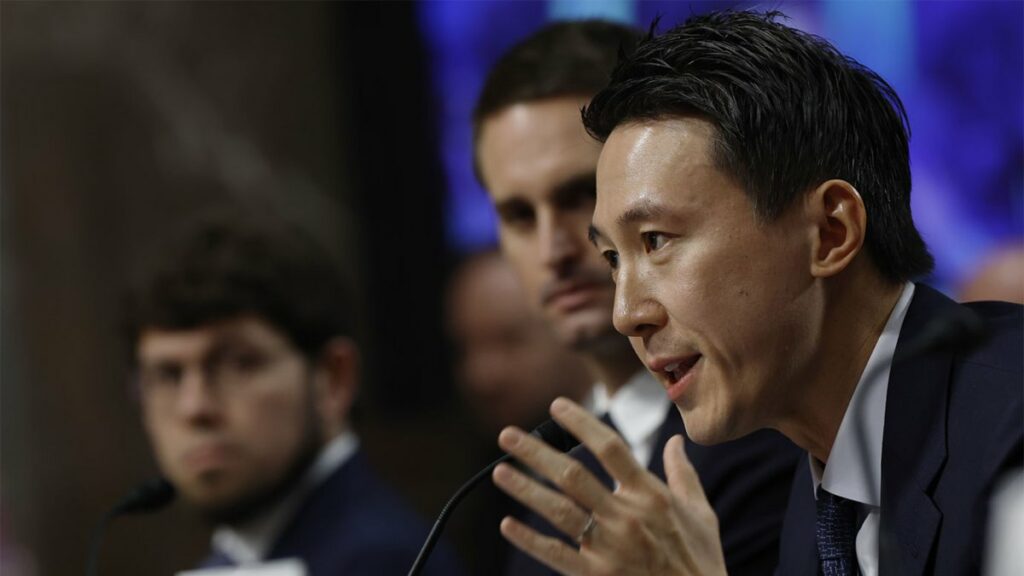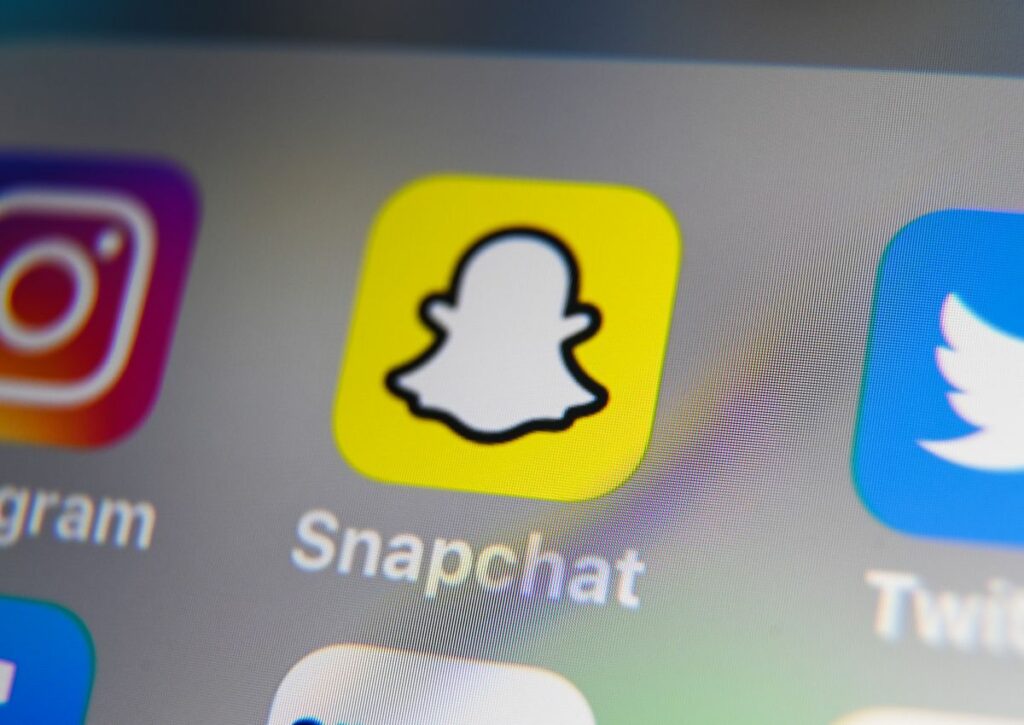Social media platform TikTok says that a bill banning the app in the U.S. is “unconstitutional” and that it will fight this latest attempt to restrict its use in court.
The bill in question, which President Joe Biden signed Wednesday, gives Chinese parent company ByteDance nine months to divest TikTok or face a ban on app stores to distribute the app in the U.S. The law received strong bipartisan support in the House and a majority Senate vote Tuesday, and is part of broader legislation including military aid for Israel and Ukraine.
“Make no mistake. This is a ban. A ban on TikTok and a ban on you and YOUR voice,” said TikTok CEO Shou Zi Chew in a video posted on the app and other social media platforms. “Politicians may say otherwise, but don’t get confused. Many who sponsored the bill admit that a TikTok ban is their ultimate goal…It’s actually ironic because the freedom of expression on TikTok reflects the same American values that make the United States a beacon of freedom. TikTok gives everyday Americans a powerful way to be seen and heard, and that’s why so many people have made TikTok a part of their daily lives,” he added.
This isn’t the first time the U.S. government has attempted to ban TikTok, something several other countries have already implemented.
TikTok is based in Los Angeles and Singapore, but it’s owned by Chinese technology giant ByteDance. U.S. officials have warned that the app could be leveraged to further the interests of an “entity of concern.”
In 2020, former President Donald Trump issued an executive order to ban TikTok’s operations in the country, including a deadline for ByteDance to divest its U.S. operations. Trump also tried to ban new downloads of TikTok in the U.S. and barred transactions with ByteDance after a specific date.
Federal judges issued preliminary injunctions to temporarily block Trump’s ban while legal challenges proceeded, citing concerns about violation of First Amendment rights and lack of sufficient evidence demonstrating that TikTok posted a national security threat.
After Trump left office, Biden’s administration picked up the anti-TikTok baton. Today, the same core fundamentals are at stake. So why do Congress and the White House think the outcome will be different?
TikTok has not responded to TechCrunch’s inquiry as to whether it has filed a challenge in a district court, but we know it will because both Chew and the company have said so.
When the company makes it in front of a judge, what are its chances of success?
TikTok’s “unconstitutional” argument against a ban
“In light of the fact that the Trump administration’s attempt in 2020 to force ByteDance to sell TikTok or face a ban was challenged on First Amendment grounds and was rejected as an impermissible ‘indirect regulation of informational materials and personal communications,’ coupled with last December’s federal court order enjoining enforcement of Montana’s law that sought to impose a statewide TikTok ban as a ‘likely’ First Amendment violation, I believe this latest legislation suffers from the same fundamental infirmity,” Douglas E. Mirell, partner at Greenberg Glusker, told TechCrunch.
In other words, both TikTok as a corporation and its users have First Amendment rights, which a ban threatens.
In May 2023, Montana Governor Greg Gianforte signed into law a bill that would ban TikTok in the state, saying it would protect Montanans’ personal and private data from the Chinese Communist Party. TikTok then sued the state over the law, arguing that it violated the Constitution and the state was overstepping by legislating matters of national security. The case is still ongoing, and the ban has been blocked while the lawsuit progresses.
Five TikTok creators separately sued Montana, arguing the ban violated their First Amendment rights, and won. This ruling thus blocked the Montana law from going into effect and essentially stopped the ban. A U.S. federal judge claimed the ban was an overstep of state power and also unconstitutional, likely a violation of the First Amendment. That ruling has set a precedent for future cases.
TikTok’s challenge to this latest federal bill will likely point to that court ruling, as well as the injunctions to Trump’s executive orders, as precedent for why this ban should be reversed.
TikTok may also argue that a ban would affect small and medium-sized businesses that use the platform to make a living. Earlier this month, TikTok released an economic impact report that claims the platform generated $14.7 billion for small- to mid-sized businesses last year, in anticipation of a ban and the need for arguments against it.
The threat to “national security”
Mirell says courts do give deference to the government’s claims about entities being a national security threat.
However, the Pentagon Papers case from 1971, in which the Supreme Court upheld the right to publish a classified Department of Defense study of the Vietnam War, establishes an exceptionally high bar for overcoming free speech and press protections.
“In this case, Congress’ failure to identify a specific national security threat posed by TikTok only compounds the difficulty of establishing a substantial, much less compelling, governmental interest in any potential ban,” said Mirell.
However, there is some cause for concern that the firewall between TikTok in the U.S. and its parent company in China isn’t as strong as it appears.
In June 2022, a report from BuzzFeed News found that U.S. data had been repeatedly accessed by staff in China, citing recordings from 80 TikTok internal meetings. There have also been reports in the past of Beijing-based teams ordering TikTok’s U.S. employees to restrict videos on its platform or that TikTok has told its moderators to censor videos that mentioned things like Tiananmen Square, Tibetan independence or banned religious group, Falun Gong.
In 2020, there were also reports that TikTok moderators were told to censor political speech and suppress posts from “undesirable users” — the unattractive, poor and disabled — which shows the company is not afraid to manipulate the algorithm for its own purposes.
TikTok has largely brushed off such accusations, but following BuzzFeed’s reporting, the company said it would move all U.S. traffic to Oracle’s infrastructure cloud service to keep U.S. user data private. That agreement, part of a larger operation called “Project Texas,” is focused on furthering the separation of TikTok’s U.S. operations from China and employing an outside firm to oversee its algorithms. In its statements responding to Biden’s signing of the TikTok ban, the company has pointed to the billions of dollars invested to secure user data and keep the platform free from outside manipulation as a result of Project Texas and other efforts.
Yaqiu Wang, China research director at political advocacy group Freedom House, believes the data privacy issue is real.
“There’s a structural issue that a lot of people who don’t work on China don’t understand, which is that by virtue of being a Chinese company — any Chinese company whether you’re public or private — you have to answer to the Chinese government,” Wang told TechCrunch, citing the Chinese government’s record for leveraging private companies for political purposes. “The political system dictates that. So [the data privacy issue] is one concern.”
“The other is the possibility of the Chinese government to push propaganda or suppress content that it doesn’t like and basically manipulate the content seen by Americans,” she continued.
Wang said there isn’t enough systemic information at present to prove the Chinese government has done this in regards to U.S. politics, but the threat is still there.
“Chinese companies are beholden to the Chinese government which absolutely has an agenda to undermine freedom around the world,” said Wang. She noted that while China doesn’t appear to have a specific agenda to suppress content or push propaganda in the U.S. today, tensions between the two countries continue to rise. If a future conflict comes to a head, China could “really leverage TikTok in a way they’re not doing now.”
Of course, American companies have been at the center of attempts by foreign entities to undermine democratic processes, as well. One need look no further than the Cambridge Analytica scandal and Russia’s use of Facebook political ads to influence the 2016 presidential election, as a high-profile example.
That’s why Wang says more important than a ban on TikTok is comprehensive data privacy law that protects user data from being exploited and breached by all companies.
“I mean if China wants Facebook data today, it can just purchase it on the market,” Wang points out.
TikTok’s chances in court are unclear
The government has a hard case to prove, and it’s not a sure decision one way or the other. If the precedent set by past court rulings is applied in TikTok’s future case, then the company has nothing to worry about. After all, as Mirell has speculated, the TikTok ban appears to have been added as a sweetener needed to pass a larger bill that would approve aid for Israel and Ukraine. However, the current administration might also have simply disagreed with how the courts have decided to limit TikTok in the past, and want to challenge that.
“When this case goes to court, the Government (i.e., the Department of Justice) will ultimately have to prove that TikTok poses an imminent threat to the nation’s national security and that there are no other viable alternatives for protecting that national security interest short of the divestment/ban called for in this legislation,” Mirell told TechCrunch in a follow-up email.
“For its part, TikTok will assert that its own (and perhaps its users’) First Amendment rights are at stake, will challenge all claims that the platform poses any national security risk, and will argue that the efforts already undertaken by both the Government (e.g., through its ban upon the use of TikTok on all federal government devices) and by TikTok itself (e.g., through its ‘Project Texas’ initiative) have effectively mitigated any meaningful national security threat,” he explained.
In December 2022, Biden signed a bill prohibiting TikTok from being used on federal government devices. Congress has also been considering a bill called the Restrict Act that gives the federal government more authority to address risks posed by foreign-owned technology platforms.
“If Congress didn’t think that [Project Texas] was sufficient, they could draft and consider legislation to enhance that protection,” said Mirell. “There are plenty of ways to deal with data security and potential influence issues well short of divestment, much less a ban.”


